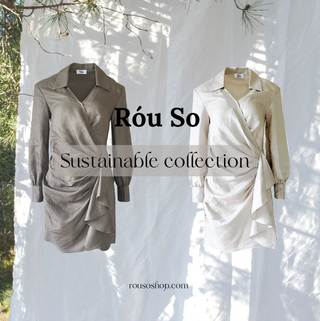In the contemporary landscape of the fashion industry, a discernible shift towards sustainability is underway, with leading brands at the forefront of this transformation. These top sustainable fashion brands have mastered the delicate balance between maintaining high sartorial standards and committing to eco-friendly practices. From pioneering the use of innovative materials to embedding ethical labor practices throughout their supply chains, their efforts represent a significant stride towards minimizing the environmental impact of fashion. However, the journey towards fully sustainable fashion is fraught with challenges. Let us explore how these brands navigate these obstacles, setting a precedent for the future of fashion.
Pioneering Eco-Friendly Materials

Among the many strides taken by the sustainable fashion industry, the development and adoption of eco-friendly materials stand out as a significant achievement. Sustainable fashion brands have become pioneers, leading the charge in transforming the industry's environmental impact through innovative use of eco-friendly materials. These materials, ranging from organic cotton and bamboo to upcycled fabrics, are at the forefront of reducing the fashion industry's carbon footprint. The emphasis on materials that require less water, energy, and chemical treatments during production is a testament to the sector's commitment to ethical manufacturing practices.
Moreover, the integration of upcycled fabrics into new collections not only exemplifies creativity but also significantly reduces waste, further mitigating the environmental impact of the fashion industry. This approach to design and production highlights the symbiotic relationship between sustainable fashion brands and the preservation of our planet. By prioritizing materials that are both kind to the environment and conducive to ethical manufacturing, these brands are setting new standards for the industry at large. Their efforts underscore the pivotal role of eco-friendly materials in the evolution of sustainable fashion, paving the way for a more responsible and environmentally conscious industry.
Ethical Labor Practices

Building on the foundation of utilizing eco-friendly materials, sustainable fashion brands are also setting new standards in ethical labor practices, ensuring fair treatment and wages for all workers involved in their supply chains. This commitment to ethical labor practices signifies a holistic approach to sustainability, recognizing that true progress involves more than just environmental considerations. It encompasses a deep respect for the individuals who make the fashion industry possible.
By prioritizing fair wages, these brands are taking a stand against the exploitation that has long been a dark aspect of fashion production. This not only improves the quality of life for workers but also contributes to more stable and thriving communities. Transparency plays a critical role in this process, as it allows consumers to see behind the scenes of their favorite products, ensuring that their purchases align with their values regarding workers' rights and ethical production.
Furthermore, the emphasis on ethical labor practices extends to advocating for stronger workers' rights globally. Sustainable fashion brands are often at the forefront of movements to improve working conditions, fight for living wages, and ensure safe work environments. This leadership has a ripple effect, influencing broader industry standards and encouraging other companies to adopt more responsible practices. In doing so, these brands are redefining what it means to be successful in fashion, proving that profitability and ethical responsibility can go hand in hand.
Innovations in Upcycling

Innovations in upcycling are transforming the sustainable fashion industry by turning waste materials into high-quality, eco-friendly apparel. This movement towards circular fashion is championed by eco fashion brands that prioritize the lifecycle of their products, ensuring that every piece of clothing contributes positively to the environment. These brands are leveraging innovative textiles derived from discarded fabrics, plastic bottles, and other non-traditional sources, setting a new standard for what it means to be truly sustainable.
The process of upcycling not only reduces the amount of waste in landfills but also significantly lowers the environmental impact associated with the production of new materials. As a result, sustainable fashion brands are able to offer unique, eco-conscious collections that appeal to a growing demographic of environmentally aware consumers. This shift towards upcycling and circular fashion reflects a broader industry trend of moving away from the 'take-make-dispose' model, promoting a more regenerative approach to fashion.
Consumer Engagement Strategies

Understanding the significance of upcycling and circular fashion, sustainable brands are now focusing on engaging consumers through targeted strategies that highlight their commitment to environmental stewardship. These brands are innovatively leveraging eco-friendly materials and ethical manufacturing practices to resonate with a growing audience concerned about the fashion industry's impact on the planet. By prioritizing transparency in supply chains, sustainable fashion brands are building trust with consumers, who are increasingly demanding clarity on where and how their clothes are made.
Consumer engagement strategies adopted by these brands include educational campaigns that shed light on the benefits of sustainable fashion, workshops on the importance of eco-conscious living, and interactive platforms that allow consumers to trace the lifecycle of their purchases. This approach not only informs but also empowers consumers, making them active participants in the movement towards a more sustainable future. Through social media, storytelling, and community-building events, sustainable fashion brands are creating a dialogue with consumers, encouraging them to make more responsible choices.
This engagement is crucial for fostering a culture of sustainability, where consumers are motivated not just by style, but also by the ethical and environmental ethos behind what they wear.
Overcoming Sustainability Challenges

Despite the growing popularity of sustainable fashion, the industry faces significant challenges in fully integrating eco-friendly practices and principles. Sustainable fashion brands are at the forefront of this movement, striving to balance the scales between high-quality, eco-friendly materials and the ever-evolving consumer preferences that demand both sustainability and style. One of the major hurdles is the sourcing of materials that are both sustainable and capable of meeting the high standards of quality and durability that consumers expect. The cost of these materials and the processes required to transform them into fashionable items often lead to higher retail prices, which can deter some consumers.
Furthermore, the fashion industry grapples with the issue of greenwashing, where companies make misleading claims about their products' environmental benefits. This practice not only undermines consumer trust but also dilutes the efforts of genuinely sustainable brands. To overcome these challenges, sustainable fashion brands must invest in transparent and verifiable supply chains, educate consumers about the true impact of their purchases, and continue to innovate in the use of eco-friendly materials. Only through a concerted effort can the industry hope to achieve a truly sustainable future.
In conclusion, the forefront of sustainable fashion is occupied by brands that skillfully blend environmental responsibility with aesthetic appeal. By pioneering the use of eco-friendly materials, adhering to ethical labor practices, innovating in the field of upcycling, and engaging consumers through transparent and educational strategies, these brands not only confront but also overcome the challenges associated with sustainability in the fashion industry.
This paradigm shift towards sustainable fashion reflects a growing commitment to ecological stewardship without sacrificing style, setting a commendable example for the industry at large.


